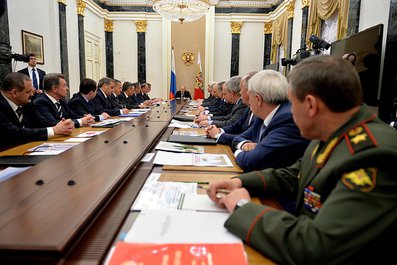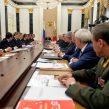
Putin Approves Draft Strategy for Countering Extremism in Russia to 2025
Publication: Eurasia Daily Monitor Volume: 11 Issue: 211
By:

On November 20, President Vladimir Putin convened a meeting of the Russian Security Council to discuss and approve a draft Strategy for Countering Extremism in the Russian Federation Through 2025. This new security document offers additional indications that countering “color revolutions” has moved center stage in Russia’s security thinking. The Strategy for Countering Extremism will focus on monitoring groups’ and individuals’ activities in the information sphere, especially social media, while mitigating the long-term risk of a color revolution occurring in Moscow. Equally, adjustments to Russia’s 2010 Military Doctrine, due to be completed by the end of the year, are also likely to place internal security high on the agenda (TASS, November 20; see EDM, November 18).
Putin’s statements to the opening of the Security Council meeting confirm the seriousness attached to the draft strategy document and its “core role” in ensuring Russian internal security. However, his remarks are traceable to the fundamental issue of avoiding a color revolution ever displacing the ruling regime in Moscow. Putin said the strategy will become a core document for “all branches and levels of power,” in the country, adding, “One of the most important aims is to establish a climate of public non-acceptance, and strengthen civil immunity against the spread of extremist and radical ideas.” Countering these threats would involve, in his view, the “state, society, [as well as] all state and public organizations” combining their actions (kremlin.ru, November 20).
Putin referred to examples of extremism including “nationalism, religious intolerance and political extremism” and the danger of “mass violations of public order.” He then commented on color revolutions and their potential threat to the Russian state: “I would like to add that in the modern world extremism is often used as a geopolitical instrument to rearrange spheres of influence. We see the tragic consequences of the wave of so-called ‘colour [sic] revolutions,’ the turmoil in the countries that have undergone the irresponsible experiments of covert and sometimes blatant interference in their lives. We take this as a lesson and a warning, and we must do everything necessary to ensure this never happens in Russia.” Combatting this threat will involve a united effort, including government ministries, agencies and civil society, which the draft document envisages (kremlin.ru, November 20).
Russian media also reported that the new strategy would increase focus on international relations, youth and migration policies in the context of the country’s numerous ethnic minorities. However, media coverage downplayed any suggestion that the strategy is draconian; stressing that Putin draws a distinction between political opposition and extremism (dpomsk.ru, November 21).
Nikolai Patrushev, the Secretary of the Russian Security Council and former Director of the Federal Security Service (FSB), said that the draft strategy to combat extremism was approved during the council session and that steps to implement the strategy will be completed by July 2015 (Kommersant, November 20). The Russian government will now prepare plans to implement the strategy over the next eight months. Patrushev stated that the strategy provides a basis for the creation of a “state system” to monitor the information field. In response to questions from journalists, Patrushev clarified that this will involve changes to criminal law and criminal procedure law. He confirmed that the strategy to counter extremism necessitates adjustments in the overall regulatory framework (Interfax, November 20).
The drafting of this security document is a result of an inter-ministerial commission headed by Interior Minister Vladimir Kolokoltsev and FSB Director Alexander Bortnikov. Following the Security Council meeting on November 20, Kolokoltsev told journalists that a key tool in preventing and combating extremism in Russian society should be “a state system to monitor the information space. He added, “One of the objectives of this strategy is to create a state monitoring system of not only telecommunication networks, but the information field in general” (gazeta.ru, November 21).
Creating a framework for information monitoring, tightening existing legislation on extremism and co-opting civil society in a complex approach toward reducing the risks of extremism are elements of the new system. Putin told the Security Council that countering extremism will demand “special attention” to “inter-ethnic” and “inter-religious relations,” working with the leaders of youth groups “teaching patriotic values and ability to resist socially dangerous behaviour [sic].” Putin also wants migration policy to improve, limiting illegal and uncontrolled migration: “We know that this breeds crime, interethnic tensions and extremism. We need greater control over compliance with regulations covering migrants’ stay in Russia and we have to take practical measures to promote their social and cultural adaptation and protect their labor and other rights.” Noting that these issues are inter-related, Putin explained that Russia must adopt a complex strategy to counter extremism: “We must constantly monitor and analyse [sic] relations between various ethnic and social groups. We should undoubtedly involve experts and researchers in this activity. I would like to stress that this is a personal responsibility of regional heads and presidential plenipotentiary envoys. On the federal level the activity will be coordinated by an inter-departmental commission on countering extremism in the Russian Federation” (kremlin.ru, November 20).
Some Russian security experts believe that tightening control and monitoring of the information space will focus on social networks. Analysis of “color revolutions,” the Arab Spring and the events in the EuroMaidan has convinced the Russian security elite that such oversight is both necessary and prophylactic. Sources in the interior ministry told gazeta.ru that the strategy to counter extremism is conceptually political and measures for its implementation will include new laws on extremism; these changes are likely to re-define the nature of extremism and offer legal authority to target bloggers and in some cases the users of social networks (gazeta.ru, November 21).
The draft Strategy for Countering Extremism in the Russian Federation Through 2025 is the culmination of a long process influencing Russian security thinking. The political-military leadership sees color revolutions, even those occurring in a neighboring state, as a potential threat to Russian security (Voyenno Promyshlennyy Kuryer, December 2, 2013). In May 2014, the Moscow Security Conference presentations reinforced this message: color revolutions feature high in the thinking of the security elite. If Putin’s first terms in office (2000–2008) centered on defending the territorial integrity of the country (mainly linked to the North Caucasus) then it seems that his latest presidential term will place regime protection at the heart of Russian security strategy.




